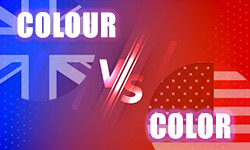
“Color” or “colour”
In the English language, “color” and “colour” both function as nouns, referring to the shade or hue of something, and verbs, referring to the act of changing the shade or hue of something. The verb is also employed figuratively to denote the act of enhancing or expressing something.

British English
colour

American English
color
As you can see above, there are two ways to correctly write the term, which differ by only one letter. The use depends on the type of English you are referring to. In this situation, it is essential to maintain consistency in your choice of English. Both spellings are considered correct, but “colour” is the predominant choice in the UK, while “color” is the commonly preferred spelling in the US.
Examples of using “color” and “colour”
The following examples will shed light on the different spellings of “color/colour” used in sentences in British English vs. American English.


“Color” or “colour” as a verb
The verb form “to color/colour” refers to the action of adding pigments or hues to something to change its appearance or make it more colorful. It’s used when you want to describe the act of applying “color/colour”. Here’s how you can use it in sentences:


“Color” or “colour” as a noun
The choice between “color” and “colour” as a noun should align with the conventions of the variety of English you are using or the preferences of your intended audience.


“Color” or “colour” in the “-ing” form
When used to indicate an ongoing action, both terms “colouring” and “coloring” in the “-ing” form function as present participles. In these sentences, “coloring/colouring” functions as a present participle, indicating that the process of coloring is happening at the described time.


FAQs
The pronunciation and meaning of “color” and “colour” are the same; they simply reflect the spelling references in their respective regions.
- “Color” is the standard American English spelling
- “Colour” is the standard British English spelling
It depends on whom you are addressing. In American English, “color” is written without an “u”. However, in British English, “colour” is written with an additional “u” after the second “o”.
It’s generally best to use the spelling that aligns with the variety of English you are using or the expectations of your audience. Mixing American and British spellings within the same piece of writing can appear inconsistent and may be distracting. To maintain clarity and consistency, it’s advisable to stick with one spelling throughout your communication.
Printing Your Thesis With BachelorPrint
- High-quality bindings with customizable embossing
- 3D live preview to check your work before ordering
- Free express delivery
Configure your binding now!
